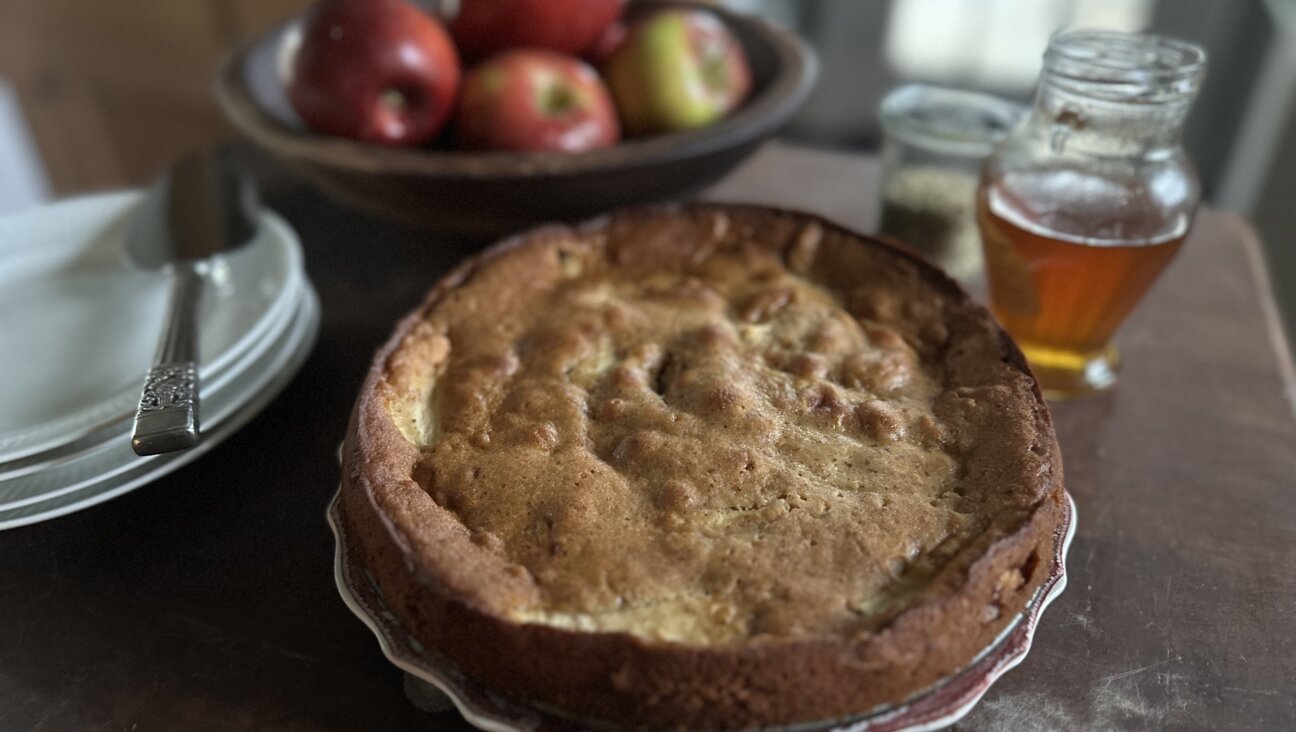‘Epic’ Kosher Catering for the Epicurean in You

Isaac Bernstein prepares dishes at a recent Epic Bites event. / Courtesy of Epic Bites
On a recent Friday afternoon, when I normally would be working or cooking for Sabbath dinner guests, I found myself in my friends Naf and Anna Hanau’s Brooklyn living room, tucking into a plate of pigeon confit drizzled with a port-balsamic glaze. Moments prior, I had sampled snapper with dehydrated olives and a blood-orange vinaigrette, and eaten one too many deep-fried smoked turkey balls that came served, in a gloriously Hanukkah-friendly fashion, with sweet quince butter.
The man behind this unlikely pre-weekend feast was Isaac Bernstein, founder and chef of the Oakland, California-based kosher catering company Epic Bites. He was visiting New York for a week to prepare a series of pop-up dinners, and Naf and Anna (who run Grow & Behold, a kosher sustainable meat company that supplies some of Epic Bites’ meat) offered to host a “leftovers lunch,” where he would cook with whatever ingredients remained after the week of events. Luckily for me and the other guests, Bernstein’s idea of leftovers included candied kumquats and steak tartare.
For the past two years, Bernstein, 30 — who sports dark plastic-framed glasses and is as comfortable wearing an Iron Maiden T-shirt as he is chef whites — has worked to redefine the standards for kosher cooking and food service. The professionally trained chef, who graduated from the French Culinary Institute, in New York, pushes creative boundaries, working with local farms to source hard-to-find herbs, like lovage, oyster leaf and cilantro flowers, and fermenting many of his own vinegars, including a fruity-smelling nasturtium blossom vinegar he bottled recently.
His clients, primarily nonkosher Jews who are organizing a dinner or event that includes kosher guests, are game to follow his culinary lead — mostly. “You cannot give everyone fried chicken skin on day one,” he said. “But they appreciate that we respect the ingredients, and that if they order something like bagels and lox, we are going to cure the salmon ourselves and add aromatics to make it special.”
Bernstein grew up in the ultra-Orthodox enclave of Monsey, New York. A lifelong iconoclast, he stopped keeping strictly kosher outside his family’s home as an adolescent. As a teenager, he caught the food bug while working at a local bagel shop. “The field of cooking attracts degenerates like me,” he joked. “There is an absolute seriousness in the kitchen, but at the end of the day, cooks get to be little kids who do creative things while working with our hands.”
He focused on baking bread in culinary school as a concession to his family (“You just cannot break as many kosher laws that way,” he said), and then apprenticed at two prestigious artisanal baking institutions: Amy’s Bread, in New York, and the San Francisco Baking Institute. Meanwhile, he ate — everything. These food experiences helped shape his palate and fueled his passion for his craft.
Today, Bernstein, who lives in Oakland, California, with his wife (an acupuncturist who grew up in an Orthodox neighborhood in Brooklyn) and two young kids, keeps, as well as cooks, kosher. But he has not lost his sense of expansive wonder around food. “I spend every penny on cookbooks, and I read all the time,” he said. “Even if I do not use octopus or pork belly, I want to understand at the deepest level what they bring to a dish, so I can translate that brininess and chew, or that crisp, fatty flavor, in my food.” On that front, he regards smoked salt as one of his secret weapons.
Despite his broad approach to cooking, Bernstein does not shy away from his Jewish food roots, which he described as an unglamorous amalgam of Diet Coke and salami sandwiches, schnitzel with ketchup and bad kosher Chinese takeout on Thursday nights. On the contrary, he embraces them.
“Look, my grandmother didn’t make cassoulet, she made cholent with so much sugary barbecue sauce, you had to get shots afterward. But it was awesome,” he said. “I want to capture that and transform it.” Case in point: The smoked turkey wing balls I could not stop eating that Friday afternoon came coated in a crust of crushed Lieber’s crackers, the pareve version of Ritz that Bernstein grew up eating.
Still, he feels very much at home in his laidback, local food loving and explicitly not East Coast Jewish-feeling Bay Area home. The community is small, but he has found a few like-minded partners, like Jonathan Hajdu, who is the associate winemaker for the kosher winery Covenant, but also bottles small amounts of his own experimental wines.
Ultimately, Bernstein hopes to open a restaurant in San Francisco’s Bay Area. “It would be like the kosher version of the upstairs cafe at Chez Panisse,” he said, referencing Alice Waters’s iconic farm-to-table restaurant in Berkeley. In other words, a menu dominated by high-quality, ingredient-driven salads, pizzas, sandwiches, homemade bread and pastries. He holds no pretense that the community has enough kosher keepers to sustain an entire restaurant, and he insists that his vision has much more to do with passion than with profit. “My catering will support me,” he said. Indeed, the restaurant would double as a production kitchen for the dairy side of Epic Bites’ business. But he believes in the importance of evolving and constantly seeking out ways to do his work better.
“Marc Vetri is a major role model,” he said of the Philadelphia-based star chef and restaurateur who built an empire out of simple but beautifully executed Italian food. “I once read somewhere that eating at his restaurants feels like you are eating at your grandmother’s house if she happened to be a Michelin-starred chef,” he said. “When I read that, I thought, ‘That’s us.’ That’s everything we want to accomplish.”
A message from our CEO & publisher Rachel Fishman Feddersen

I hope you appreciated this article. Before you go, I’d like to ask you to please support the Forward’s award-winning, nonprofit journalism during this critical time.
We’ve set a goal to raise $260,000 by December 31. That’s an ambitious goal, but one that will give us the resources we need to invest in the high quality news, opinion, analysis and cultural coverage that isn’t available anywhere else.
If you feel inspired to make an impact, now is the time to give something back. Join us as a member at your most generous level.
— Rachel Fishman Feddersen, Publisher and CEO























